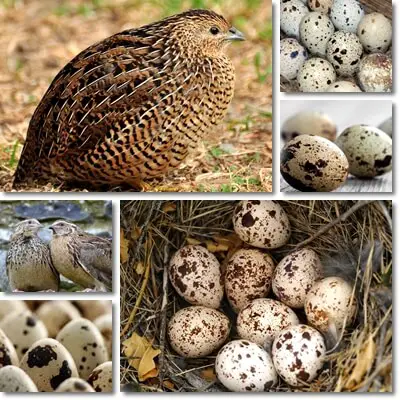Quail eggs are seen as the epitome of good health and a far better option than chicken eggs in terms of nutrition. But the truth is they have about the same nutritional value as chicken eggs and will provide similar benefits. As for their health effects, a moderate intake of quail eggs within a balanced and varied diet represents an important source of several essential nutrients, and provides benefits for the nervous and immune system, bones, muscle, skin and hair, as well as boosts energy metabolism and fertility and supports both mother and child health during pregnancy.
One quail egg weighs about 9 g which is very little compared to one medium to large chicken egg which weighs about 50 g. This means that 10 quail eggs are equivalent to about two medium to large chicken eggs, or 100 g of chicken egg. But since quail eggs have a higher egg yolk to egg white ratio, you do get slightly more nutritional input from eating quail eggs versus chicken eggs because most vitamins, minerals and essentially all of the fat and all of the cholesterol in eggs are located in the yolk.

The higher egg yolk to egg white ratio in quail eggs is in itself a good reason to eat more quail eggs since the egg yolk houses most of the nutritional value of the egg. And despite popular belief that you have to eat egg white to get protein, the yolk too has a high content of protein. In fact, egg yolk has more protein than egg white for the same amount so quail eggs having more yolk means you get more protein compared the default egg variety, chicken.
However, quail eggs also have more than double the cholesterol vs chicken eggs, which is not necessarily a bad thing if intake is reasonable. All of the cholesterol is contained in the yolk and that is not a reason to avoid eating egg yolk or quail eggs. On the contrary, eating quail eggs is good for you, with plenty of benefits stemming from the cholesterol content of the yolk.
If the high content of cholesterol in quail eggs is deterring you from including them in your diet, know that cholesterol is a source of important benefits for health and good for you in reasonable amounts. Cholesterol is needed to process vitamin D produced via sun exposure and protects the nervous system from demyelination, among other benefits for health.

What are the benefits of eating quail eggs?
Satiating and energizing
With 13 g of protein, 11 g of fat and 158 kcal per 100 g as well as a generous B vitamins and mineral content, quail eggs provide excellent nutrition, making a satiating and energizing food of superior nutrition. The good iron content further provides energy to muscles, contributing to elevated energy levels. However, because they are a rich source of fat and have a moderately high energetic value, they are best eaten in moderation, as part of an overall clean, balanced and varied diet.
Good for building muscle and repairing muscle damage
Quail eggs are a high-protein food, ideal for building muscle and creating a beautiful muscle tone. 100 g of quail eggs, which amounts to about 11 eggs, provides almost 25% of the recommended daily intake of protein for an average adult on a 2000 kcal diet. Moreover, quails eggs are rich in B vitamins and iron which help sustain intense physical activity required to build muscle.
Good for skin and hair health
The reason why quail eggs are good for skin is because they have important amounts of vitamin A and fats. Vitamin A has anti-aging benefits, protecting against free radical damage and helps maintain skin elasticity and a youthful appearance. Fats are part of the composition of cell membranes, regulating permeability and allowing skin cells to retain moisture for a plump, youthful look. Cholesterol in particular has benefits for skin health because it helps synthesize hormones that maintain healthy, beautiful skin.
Quail eggs are also a source of complete protein, providing all essential amino acids as well as non-essential amino acids. The amino acids in quail egg protein help build hair strength, stimulate hair growth and reduce hair loss. Iron nourishes the scalp, ensuring a good oxygen supply to hair roots, promoting hair growth and reducing hair loss. Vitamins D and B12 in quail eggs help prevent hair loss.. Vitamin A and the unsaturated, saturated fats and cholesterol in quail eggs help maintain hair moisture and combat brittle hair.
Immune boosting properties
Quail eggs are a good source of vitamin D, a nutrient with important immuno-modulating action and anticancer properties. They are also rich in protein which plays a crucial role within the immune system, serving as raw material for producing antibodies, among other benefits. Antibodies are essentially protein-based immune system cells that scavenge for and neutralize pathogens like bacteria, viruses. or cancer cells. Cytokines are also small proteins belonging to the immune system which modulate inflammation levels in the body. Proteins are important elements in the composition of phagocytes, a type of white blood cells that eat bacteria and infected cells.
Good food to eat for bone health
Eating quail eggs is good for bone health, preventing rickets and frail bones. 100 g of quail eggs has 226 mg of phosphorus, almost 20% of the recommended daily intake for the average adult (phosphorus daily intake is set at 1250 mg). Phosphorus represents an important element in our bone structure and is responsible for bone mineralization, initiating the process of bone formation. Having a sufficient intake of both phosphorus is vital for strong and healthy bones and teeth.
Quail eggs also have good amounts of vitamin D (7% of daily values per 100 grams). Vitamin D further regulates processes that help maintain good bone density. More exactly, vitamin D helps the bones absorb phosphorus and calcium for improved bone density. The egg variety also provides small amounts of calcium and magnesium which contribute to bone structure.
Excellent brain food
Quail eggs contain important amounts of fats and are a source of complete protein which recommends them as a good food to support intellectual effort. Both fat and protein nourish the brain and support nervous system activity and cognitive functions. The brain is partially made up of fats and having a sufficient dietary intake helps support and boost cognitive functions such as memory and learning and reduce brain fog.
Furthermore, the amino acids in quail eggs help synthesize hormones and neurotransmitters in the brain that regulate mood, appetite, sleep and impact productivity. Cholesterol in particular is important for brain and nervous system health because it helps make up the protective myelin sheath insulating the tail of nerve cells. In the absence of cholesterol, this protective coating loses its insulating properties which could lead to degenerative diseases of the nervous system such as multiple sclerosis.
Vitamin B12, also found in generous amounts in quail eggs, further protects against demyelination and promotes brain and nervous system health. And below is a beautiful video about cooking quail eggs that will surely make you hungry and craving the tiny eggs.
Boost fertility in men and women
The reason why quail eggs are good for fertility is because of their good nutritional value. Quail eggs have good amounts of specific nutrients known to hold benefits for fertility. More exactly, they contain cholesterol and fatty acids, iron, vitamin B12, small amounts of vitamin D and zinc, as well as manganese with benefits for fertility.
With 5.6 g of unsaturated fatty acids, 3.56 g of saturated fats and 844 mg of cholesterol per 100 g, quail eggs encourage the production of hormones that improve fertility and favor conception. Cholesterol in quail egg yolk also helps the body synthesize vitamin D from sun exposure which is required for better fertility in women. Iron and vitamin B12 help with the production of red blood cells, supporting pregnancy evolution. Zinc, together with vitamin D both boost male fertility.
Benefits for pregnancy
Quail eggs are rich in vitamin B12 (1.58 micrograms (mcg) per 100g) and vitamin B9 (66 mcg per 100 g). Vitamins B12 and B9 are scientifically proven to help prevent neural tube defects of the brain, spine and spinal cord of babies in the uterus.
Quail eggs also contain iron which, together with vitamin B12, supports the production of red blood cells and favors a good evolution of the pregnancy. Research shows expecting mothers who suffer from iron-deficiency anemia during the first trimester of pregnancy have higher risks of preterm birth and low birth weight. Lastly, quail eggs are naturally rich in protein and provide all essential amino acids which help with brain development of the baby in the womb.
Conclusion
Overall quail eggs are a healthy addition to most diets, provided they are consumed in moderate amounts, as part of an overall balanced and varied diet. Intake is best tailored to individual nutritional requirements and in accordance to the level of physical activity practiced and the restrictions imposed by any existing health conditions.
If you decide to raise your own quails, know they are prolific egg layers when well fed and you will most likely enjoy a fresh supply of eggs every day, each quail laying an average of one egg a day. The females will lay eggs with or without males, the only difference being eggs will be either fertile or not. Lastly, the best and safest way to eat quail and any eggs really is to cook them well to prevent any form of foodborne illness.
